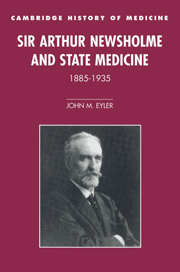Book contents
- Frontmatter
- Contents
- Illustrations
- Preface
- Abbreviations
- PART I THE MEDICAL OFFICER OF HEALTH AND THE LOCAL SANITARY AUTHORITY
- PART II NEWSHOLME AT THE LOCAL GOVERNMENT BOARD
- 7 Poverty, fitness, and the Poor Law
- 8 The Local Government Board and the nation's health policy
- 9 Launching a national tuberculosis program
- 10 The Great War and the public health enterprise
- 11 Infant and maternal mortality, interdepartmental conflict, and Newsholme supplanted
- PART III THE OLD WORLD AND THE NEW: NEWSHOLME AS ELDER STATESMAN
- Select bibliography
- Index
- Titles in the series
7 - Poverty, fitness, and the Poor Law
Published online by Cambridge University Press: 04 December 2009
- Frontmatter
- Contents
- Illustrations
- Preface
- Abbreviations
- PART I THE MEDICAL OFFICER OF HEALTH AND THE LOCAL SANITARY AUTHORITY
- PART II NEWSHOLME AT THE LOCAL GOVERNMENT BOARD
- 7 Poverty, fitness, and the Poor Law
- 8 The Local Government Board and the nation's health policy
- 9 Launching a national tuberculosis program
- 10 The Great War and the public health enterprise
- 11 Infant and maternal mortality, interdepartmental conflict, and Newsholme supplanted
- PART III THE OLD WORLD AND THE NEW: NEWSHOLME AS ELDER STATESMAN
- Select bibliography
- Index
- Titles in the series
Summary
POVERTY, EVOLUTION, AND CHARACTER
Some months ago an intelligent clergyman expressed surprise that with so many doctors there was any disease left. I made the obvious retort that it was even more surprising that with so many clergymen, sinners still abounded. The two cases are of course only comparable in so far as sin and disease are both caused by aberrations from the path of duty over which the individual or the community could exercise control.
During his years in Brighton Newsholme had risen to prominence in his profession. He had developed a reputation as an active and able administrator. In 1907 Edward Cox Seaton, Medical Officer of Health for Surrey County Council and lecturer at St. Thomas's Hospital Medical School, described the work of Brighton's Health Department in glowing terms and called the Brighton system a model for other local authorities to emulate. He emphasized especially Brighton's achievement in housing, its success in establishing an effective, comprehensive, tuberculosis program, and the care and economy in administration. Newsholme had proven to be a prolific writer as well as a successful administrator. By the time he left Brighton, he had published six books and at least four later editions of these, some ninety articles and chapters, two dozen annual reports, and numerous quarterly and occasional reports. His works were distinguished for their mastery of epidemiology, and he was without question one of the nation's leaders in the field.
- Type
- Chapter
- Information
- Sir Arthur Newsholme and State Medicine, 1885–1935 , pp. 195 - 219Publisher: Cambridge University PressPrint publication year: 1997



